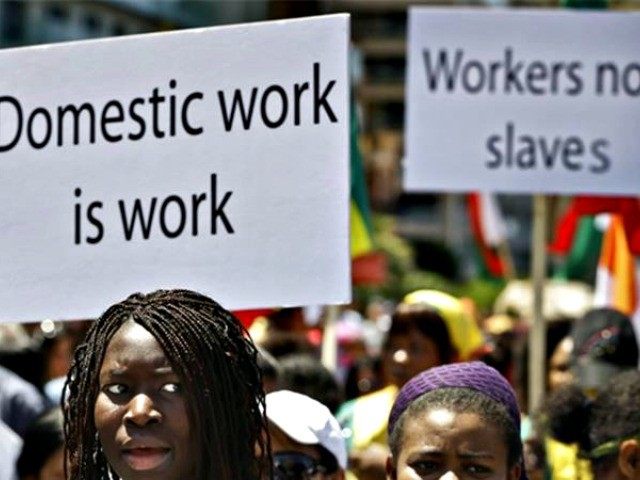The Guardian published a damning report on recruitment agencies selling women as slaves in Kuwait. These agencies lure women to the tiny country with promises of work, but the women are “sold like slaves” and resold numerous times. The publication interviewed women from Sierra Leone, but research suggests this is a long-term problem in Kuwait, affecting women from other countries, as well.
“[The agents] took us to their offices and people would come to look at us,” explained one woman who left her job as a nurse in Sierra Leone. “If they said, ‘I want this person,’ they took you to their house.”
These women told The Guardian they paid $1,480 “to recruitment agents in Sierre Leone on the promise of jobs as nurses in hospitals or in the hotel industry.” Instead, they are forced to work as maids.
“You have to work 24 hours [with] no day off,” cried Adama, 24. “You can never leave the house … You are not allowed to use mobile phones. These people are not good.”
Adama’s employer spilled hot water on her leg, which left horrific scars.
“I was crying, [but] she did not even look at me,” she explained. “I said, ‘Madam, why you do this to me?’ She told me that I’m a slave … I’m too slow, I’m not fast enough.”
The recruitment agencies give the buyers a 100-day guarantee on the women. During this time, the buyers are allowed “to return domestic workers they are not happy with and get a refund.” The agency may also resell these women “for up to two years” to other families. These women have no place to go once in the country, though Kuwait’s government claims to attempt to stop the illegal slave trade:
Once employed as domestic workers in Kuwait, women find it difficult to leave if they suffer abuse. Under Kuwait’s kafala sponsorship system, domestic workers are not allowed to leave or change jobs without their employer’s permission. With their residency status also tied to their employer, if they run away they become “illegal.”
Last year, stories of abuse suffered by Sierra Leonean women in Kuwait prompted the country’s authorities to follow other governments, including those of Indonesia and Nepal, in banning its citizens from being employed as domestic workers in the country. Yet they continue to come through informal channels.
“It’s a total deception,” said Saidu Bangura, the cultural attaché at the Sierra Leone embassy in Kuwait. “Recruitment agents in Kuwait contact agents in Sierra Leone through the internet and ask them to recruit workers. I want to appeal to these women not to believe anyone who wants them to come to Kuwait. It’s only going to bring punishment and distress.”
In November 2013, “Rose Nakato” (a fake name for her protection) told her story about slavery in the country. She is originally from Uganda and managed to escape slavery from Kuwait. One of her friends connected her to a recruitment agent in Kenya about a lucrative job in supermarkets in Kuwait. Once she arrived in Kuwait, a woman took away her passport, drove to a hotel, and informed her that she was receiving a job as a housemaid. The work was hell and the employers mistreated Rose on a daily basis. She even witnessed men murdering a Filipino woman for her kidney. Finally, Rose snuck out and contacted Interpol. She told them everything:
The Ugandan agents in Kuwait were now making frantic moves to have me back home as soon as possible so that their cover was not blown. They calculated the amount of money I had made and that is what they used to procure my air ticket.
A day later, I was booked onto a plane back to Nairobi from where I boarded a bus to Kampala. I didn’t want to expose myself once I got back so I just went straight home. I was reunited with my family in Kawempe; they hadn’t heard from me ever since I went to Kuwait.
The following day, I went and reported the incident to Police. I am now trying to recover from the trauma I suffered in Kuwait. I spend most of the time indoors trying not to expose myself to the agents who had contacted me and sent me to Kuwait, otherwise they would kill me when they know that I am here.
One thing I tell young girls is to be patient, and avoid people who would come with offers of jobs out of the country.
The government constantly promises laws to protect domestic workers, but none are passed.
“There has been a draft law for domestic workers for a long time, but it has not been passed by parliament,” claimed Abdul Alghanim, the man in charge of the migrant workers office at the Kuwait Trade Union Federation. “In my opinion the government and parliament are not interested in taking serious steps for that.”

COMMENTS
Please let us know if you're having issues with commenting.